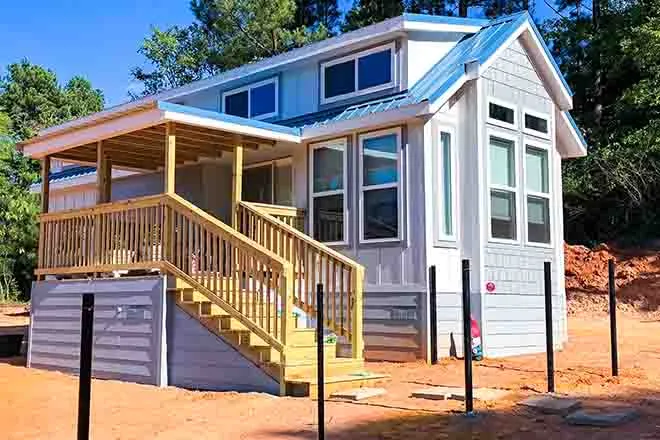
Colorado Democrats advance property tax agenda during special session
© iStock - Ligorko
(Colorado Newsline) As Colorado lawmakers convened for a special legislative session Friday devoted to hammering out property tax relief, it became evident that bipartisan compromise is unlikely as the two parties disagree on how deep of a cut is feasible and how to best pay for it.
By late Friday evening, a dustup over procedure delayed Senate work and a suite of Democratic bills had preliminary approval in the House, setting the course for a modest property tax rate cut similar to the one outlined in the recently defeated Proposition HH — as well as assistance to renters and lower-income families — on a longer timeline than originally planned.
Governor Jared Polis called lawmakers back to the Capitol for a special session to focus on a short-term plan for next year’s property tax bills after the failure of Proposition HH, a 10-year property tax rate cut scheme. Colorado homeowners are facing a property tax spike as home values rise, and lawmakers are now working to pass legislation to soften the increases.
The plan Democrats are working to pass upholds from the proposition the same rate cut and exemption, but it differs in that it does not include tax relief for commercial properties. It also uses general fund money for backfill instead of surplus money the government collects under the Taxpayer’s Bill of Rights that is otherwise refunded to taxpayers.
The Senate was unable to give the bill preliminary approval on Friday evening as Republicans pushed against the process Democrats wanted to use to shuttle the legislation through quicker than usual. The chamber will take it up for second reading on Saturday morning instead.
Senate Bill 23B-1 would reduce the property tax rate to 6.7% from 6.765% and would exempt the first $50,000 from a home’s value for assessments. It would use $200 million from general funds to completely repay school and fire districts for lost property tax revenue and partially repay local governments and other local districts based on growth rates.
The drama began in the morning, when Republican leaders brought up concerns with the intended three-day special session schedule. Senate Minority Leader Paul Lundeen of Monument and Sen. Bob Gardner of Colorado Springs pulled Senate President Steve Fenberg of Boulder aside on the Senate floor to argue that there wasn’t enough time for lawmakers or the public to read through the bills before they went to committees and the floor for debate.
They also argued that lawmakers were not given the appropriate three-day notice to work under special orders, which speeds up the timeline senators can debate and pass bills. That is how Democrats planned to run the session in order to wrap it up by Sunday and not run into the week of Thanksgiving.
Fenberg, visibly upset at times during the conversation, said that Republicans were notified of the intended schedule ahead of time and that some of the bills were pre-released on Thursday.
“Going back on the things we discussed openly and in the spirit of collaboration is a slap in the face,” Fenberg told Republicans.
The bills proceeded as normal through their committees during the day despite the morning quarrel, and the Democrats’ main property tax relief bill, one to create a summer student nutrition program, and another to make Taxpayer’s Bill of Rights refund checks equal passed their Senate committees on party-line votes.
In committee, organizations and individuals representing local governments stayed neutral on SB23B-1 but expressed desire for higher levels of repayment.
When leadership went to begin debate on it under special orders later in the day, Republicans resisted. Because the three-day notice wasn’t given, the chamber needed a two-thirds approval for special orders. With a 23-member caucus, Democrats needed one Republican to vote with them. Democrats lost the motion on a roll-call vote, but during a subsequent voice vote, Fenberg declared it successful amid major Republican protests.
Republicans wanted more time for both the procedural reason, they said, but also to give the public more time to read the bills and give input.
“The process is there to ensure due consideration of legislative proposals,” Gardner said.
Fenberg called the attempt to delay the vote political theater.
“You’ve been begging for a special session for months. Now we’re here and you don’t want to take up the debate on a bill that really isn’t controversial and should, in my mind, be unanimous,” Fenberg said. “We are here to do work, to do what is in the governor’s call, which is what Republicans have been asking for for months.”
The voice vote cleared the way for the Senate to debate the bill Friday night. It didn’t end up mattering, however, as Fenberg laid the calendar over until Saturday morning. That pushes the timeline of the special session back, as the Senate will not be able to give final approval to the bills and send them over to the House until Sunday.
In addition to the main property tax rate bill, the Senate will also debate a bill to make TABOR refund checks equal on Saturday. TABOR is a state constitutional amendment adopted in 1992 that limits the amount of revenue the state can retain and spend. The limit rises based on inflation and population growth, and revenue collected in excess of the limit must be refunded to taxpayers. Under the bill, taxpayers would all get a check for about $800 instead of a check amount dependent on their income level.
The Senate was able to pass a bill to create a nutrition program for students on summer break during second reading. That bill was on the consent calendar and did not need the special orders vote.
House gets through second readings
The House did not face similar procedural drama. It passed three bills on second reading Friday night and is set to give them final approval on Saturday.
That includes a bill to increase the federal earned income tax credit for this tax year from 25% to 50% for working class families, which sponsors say would affect 400,000 families in Colorado. It would be paid for using $185 million from the most recent TABOR surplus amount. Republicans strongly object to that payment mechanism because they argue that voters, through their rejection of Proposition HH, signaled that they don’t want any reduction in their TABOR refund checks.
“The EITC is a proven tool to help lift people out of poverty and support hard-working people and families across Colorado. During the testimony we heard today in the Finance Committee, we heard directly from Coloradans about what boosting the EITC would mean for them, and we heard it would help them cover the essentials while they are on the frontline of an affordability crisis,” Rep. Jenny Willford, a Northglenn Democrat, said.
The House also passed bills on second reading to create a task force to study and develop a permanent property tax structure for the state and appropriate money to support the property tax deferral program.
At about 11 p.m. on Friday, the House laid over until Saturday morning a bill to invest an additional $30 million for emergency rental assistance, bringing the statewide assistance to a total of $65 million — a policy that progressives and local Denver leaders called for earlier in the week to provide relief to the state’s renters at the same time lawmakers turn their attention to homeowners. The money would be for residents who make at or below 80% of the area median income who are at risk of eviction to use for rental debt, future rent, utilities, late fees and court costs.
Democrats kill Republican bills
Democrats enjoy a large majority in both chambers, so they do not need Republican support to pass their agenda. Republicans do not have much power to enact or amend policy, but they can use delay tactics to stall work and pressure Democrats to compromise.
Democrats killed every Republican bill during their committee hearings on Friday, including the Republicans’ alternative to the assessment rate and valuation plan. Republicans wanted to use general fund reserve money to cut the residential rate to 6.5% and exempt $80,000 from the assessed value, and put commercial tax rates at 25% with a $60,000 exemption.
Republican bills to put a hard cap on property assessment increases and create a task force on tax code more broadly, as well as a bipartisan bill to expand the homestead property tax exemption, also died in committee.
Both chambers will start up again Saturday morning.
Colorado Newsline is part of States Newsroom, a network of news bureaus supported by grants and a coalition of donors as a 501c(3) public charity. Colorado Newsline maintains editorial independence. Contact Editor Quentin Young for questions: info@coloradonewsline.com. Follow Colorado Newsline on Facebook and Twitter.

















